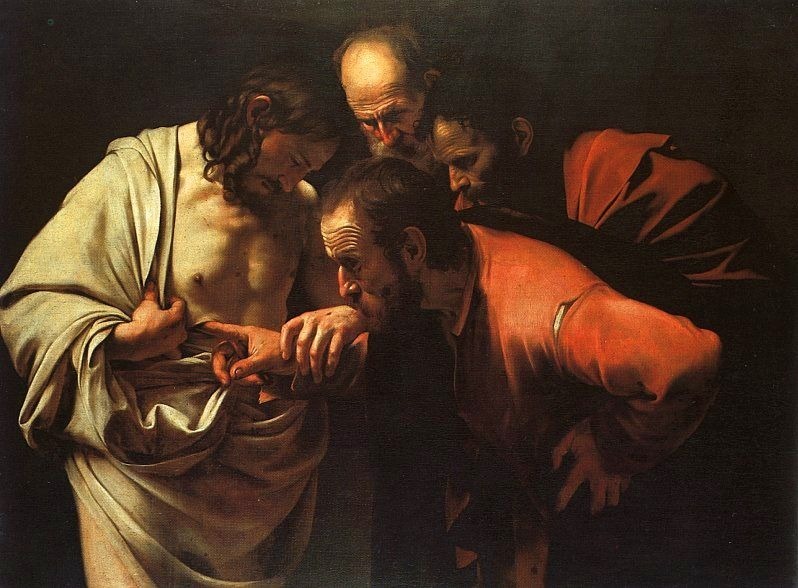25-27 April 2014
Homily of the Apostolic Nuncio
His Grace Archbishop Petar Rajič
Acts 2:42-47; 1 Pt 1:3-9; Jn 20:19-31
Following the crucifixion and death of Jesus on the cross, the disciples were closed in a room for fear of the Jews. Their Master had been killed and now they were afraid for their own lives, for they believed they would be next in line for crucifixion. Yet to their amazement, Jesus appeared to them and calmed their hearts with his greeting Peace be with you. He not only dispersed all their fears but he also gave them a special commission, to go out and preach the good news.
One of the apostles, Thomas had his doubts and he would not believe the good news of the resurrection of Christ until he saw him personally and touched his wounds. Thomas withdrew from the community and was not with the Eleven when Jesus first appeared. He probably was so devastated by Jesus’ death that he preferred to suffer alone. Thomas was the type of person who had to be sure before he believed. It is easy to criticize Thomas’ lack of faith, but are we not all like him at times? We ought to thank Thomas for his initial doubts, because it provided us with the best proof the resurrection of Christ after his personal encounter with the risen Lord.
We can now ask ourselves, what is our initial reaction to the news of Jesus’ resurrection? Even many Christians today unfortunately have their doubts and questions. To some, Jesus’ words and teachings are too demanding and uncomfortable. They erroneously think that the Lord threatens their way of existence and that he takes too much away from them. We tend to cling to our sins, our false idols and bad habits, as if our lives depended on them. Some would prefer that Jesus stay in the tomb, that he not intervene in their lives or that he would remain at a safe distance. However, the Lord came into the world and he does today as well, in order to touch our lives personally with his grace, to enliven us, renew us, and give us hope for the future.
Do we truly therefore believe in the resurrection, or would we like to see Christ like Thomas did before we are convinced? It is interesting to note here that Jesus understood Thomas’ doubt and that he came towards Thomas in order to help heal his disbelief. Jesus always takes the initiative when we have doubts and difficulties, when we are full of unresolved questions. The Lord comes us to us to heal our disbelief and calm our souls and minds.
In the end Thomas gives in. When Jesus appeared to him on the second occasion, Thomas expressed total faith by saying: My Lord and my God. He was invited to touch Jesus but we don’t know if he really did. The great Italian artist Caravaggio in one of his paintings titled ‘The Incredulity of Saint Thomas’, depicted this scene in which Christ and Thomas meet and the Lord takes the arm of Thomas and draws it to himself. The apostles’ finger actually enters the wound in the side of Christ and all the while Thomas looks straight forward in amazement.
Thomas gave in to Jesus’ offer of peace. Jesus said: Blessed are those who have not seen and have believed. The peace that the Lord offers is not just a nice wish, certainly not an empty promise, but a reality. His peace is present and the source is in him, yet he gives it to us freely and willingly. It is within us. It is not imposed, but offered to us for our taking. It is a fruit of our trusting and believing in him though we had not seen him nor touched him personally.
Our faith in the resurrection invites us to encounter the living Lord in our worship and our prayer. It compels us to accept the fact of the resurrection and Christ’s offer of peace to each of us. His peace is a fruit of his Divine mercy, the forgiveness freely given to us on Calvary so that our sins would be wiped away forever. His peace is the reassurance that our sufferings when united to his, do have meaning and that they lead us to a greater love that cannot be cancelled or forgotten, just like the wounds of Christ that remain in his glorified body as a sign of God’s everlasting love towards us. His peace is also the knowledge that our wounds and weaknesses are no longer limitations but opportunities for growth. We too have received the same commission of Jesus to the first disciples, that is, to go out and tell the good news, with our words and by our lives that Jesus Christ is Lord, so that all may believe!


